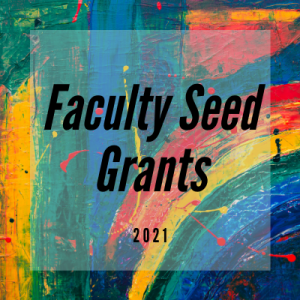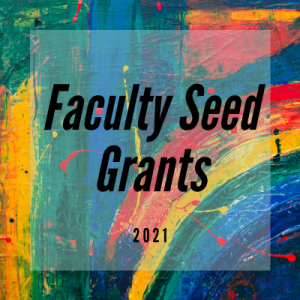Announcing 2021 Faculty Seed Grant Awards


April 2021
The University of Michigan’s Institute for Research on Women and Gender (IRWG) has awarded 12 Seed Grants for faculty projects on women, gender, and sexuality. The grants support individual research activities, as well as collaborative projects, pilot studies, and initial research efforts, with nearly $70,000 awarded.
The 2021 seed grants were awarded to the following faculty projects:
Lydia Kelow-Bennett – Assistant Professor, Department of Afroamerican and African Studies, College of LSA
Collaborator: Nikki Lane, Assistant Professor, Spelman College
Black Feminist Pedagogies of Black Popular Culture
Black popular culture is a rich site for teaching about race, gender, sexuality, class and many other vectors of structural power and identity. However, teaching Black popular culture is fraught because of struggles over authenticity, ownership, and its circulation in digital media and the broader mass culture in the U.S. In “Black Feminist Pedagogies of Black Popular Culture,” we seek to provide educators with a guidebook to teaching Black popular culture using Black feminist and Black queer pedagogies, in order to equip all educators to responsibly navigate the intersectional terrain of Black popular culture as a site for critical thought.
Greta Krippner – Associate Professor, Sociology, College of LSA
Preferred: Race, Gender, Genes and the Individualization of Risk
This project asks how it is that we have come to think of risk as a property of individuals rather than a property of groups. Why do we imagine that risk is appropriately treated as subject to individual calculation, even when experience demonstrates that our fates are intertwined? While one might assume that the individualization of risk is a recent product of neoliberalism, my historical research reveals that this development was an unintended result of movements for inclusion on the part of African Americans, women, and gays and lesbians who sought access to markets for risk over the twentieth century.
Richard M. Tolman – Professor, School of Social Work
Collaborator: Lisa Young Larance, Joint Doctoral Student in Sociology and Social Work
Survivor Perspectives of their Abusive Partners’ Battering Intervention Program Contact
Men’s violence against women poses a global public health crisis. The most frequent criminal legal system sanction holding men accountable for their violence is court-ordering those convicted of domestic violence to complete battering intervention programming (BIP). However, BIPs’ long-term effectiveness remains in question, with concerns that BIPs are too closely aligned with policing and the courts, contribute to racial disparities in criminal legal system involvement, and may not maximize survivor safety. This project assesses BIP effectiveness from the perspectives of diverse women whose abusive partners had BIP contact. Centering survivor perspectives is fundamental to reimagining systems’ responses to intimate partner violence.
Julie Ma – Assistant Professor, School of Social Work, UM Flint
Collaborator: Shawna J. Lee, Associate Professor, School of Social Work, U-M Ann Arbor
Wellbeing of women and children in low- and middle-income countries: The intersection of gender inequality and economic deprivation
Violence against women and children is a global public health priority. This project uses data from the United Nations International Children’s Emergency Fund (UNICEF) Multiple Indicator Cluster Surveys (MICS) to investigate how social contextual factors that perpetuate family violence are associated with the wellbeing of women and children with a focus on the intersection of gender-based inequality and economic deprivation. This project seeks to inform culturally appropriate interventions that reduce favorable attitudes toward family violence and prevent women and children’s exposure to violence in low- and middle-income countries.
Elisa M. Maffioli – Assistant Professor, Health Management and Policy, School of Public Health
Understanding abortion-related complications in Somaliland and midwives’ role in the provision of quality post-abortion care and modern contraceptives focusing on Internally Displaced People
Inadequate access to post-abortion care contributes to maternal morbidity and mortality, especially in fragile internally displaced populated states such as Somaliland. The goal of the project is to understand the burden of illegal abortion, un-met need for modern contraception, access to post-abortion care, and co-create contextual strategies to increase midwifery-led post-abortion care in the country.
Victor Mendoza – Associate Professor, Women's & Gender Studies, English, College of LSA
Extimate Attachments: Race and the Promise of Imperial Citizenship
A feminist studies, queer- and trans-of-color studies, comparative ethnic studies, and literary and cultural studies project, this book manuscript examines how racialized and indigenous people in the U.S., at the beginning of the twentieth century, were compelled to reimagine gendered and sexual intimacies “here,” within the metropole, in response to overseas U.S. imperial colonialism “out there,” in the Philippines.
Sarah Peitzmeier – Assistant Professor, Department of Health Behavior and Biological Sciences, School of Nursing
Collaborator: Maia Kobabe, Artist
“Imagine a world in which we can all breathe”: Disseminating the findings of the Binding Research to Advance Transmasculine Health (BREATHE) Cohort through art to reach marginalized transgender communities
Many transmasculine people practice chest binding, i.e. flattening the chest for a more masculine or less feminine gender expression. This practice has mental health benefits, but sometimes results in negative physical symptoms. We conducted research tracking what binding practices are associated with greater or lesser risk of physical symptoms in order to make recommendations about safer binding. This project collaborates with a queer/trans graphic artist to develop an “evidence-based zine” to disseminate results of this research to transmasculine communities, and evaluates the use of the zine as novel health education tool.
Beth Glover Reed – Associate Professor, School of Social Work
Reaching Diverse Vulnerable LGBTQ+/SGL Older Adults in SE Michigan: A Collaborative Project to Identify Current and Future Housing and Health Needs within Intersectionality Frameworks [Critical Intersectionality and LGBTQ+ Older Adults]
This project strengthens scholarly and practical impacts of a survey of diverse LGBTQ+ older adults, developed with a coalition of eight LGBTQ+ community organizations in Southeast Michigan. Funds will support targeted recruitment for under-represented, particularly vulnerable subgroups of LGBTQ+ older adults: those over 75, in precarious or supported housing, particular ethnic groups. Goals are to: a) identify disparities and strengths, current circumstances, preferences about health and housing; b) characterize patterns among those with shared and different positionalities (culturally defined status characteristics), c) explore impacts of COVID-19; d) develop recommendations for needed change/goals; and e) contribute to intersectionality scholarship and methodologies.
Deborah Rivas-Drake – Professor, Psychology, College of LSA, Education, School of Education
Collaborators: Bernardette Pinetta, Doctoral Student in Education and Psychology, Diana Amaya, HOPE Youth Leadership Program Director, Beatriz Perez, HOPE Youth Leadership Program Coordinator
¡Poderosas y Orgullosas! Strengthening Latina’s Civic & Political Capacities
As part of one of the largest and fastest-growing youth populations, Latinas have the potential to reshape political, economic, and social institutions to be more socially just and equitable. However, civic and political opportunities provided to young Latinas, are limited, particularly those in underserved areas. Moreover, civic and political spaces rarely center their racialized or gendered experiences which are critical to informing the ways they choose to engage against social inequities. This project explores how educators, parents, and policymakers can support Latina youths’ civic/political development in ways that are attentive to their intersectional identities and experiences.
Kimberly Saks-McManaway – Lecturer IV/Director of Master of Public Administration Program, Department of Political Science, UM Flint
Collaborators: Silviya Gancheva, Ph.D. candidate, Wayne State University, Department of Political Science; Kevin G. Lorentz II, Ph.D., Lecturer, Department of Political Science, Saginaw Valley State University; and Makenzie Schroeder, Graduate Student, Department of Communication Studies, University of Missouri at Columbia
“Brighter Times Ahead” but “Don’t Blow It Now:” Assessing Racial and Gendered Impact of COVID-19 Government Messages
While much has been said about how women leaders have been successful in slowing the spread of COVID-19, little empirical research has looked at the challenges faced by leaders on the basis of gender, gender conformity, and race with respect to pandemic-related policy messages. This project seeks to empirically study the messages and the effects of messenger identity on acceptance of policy messages and compliance with policy directives. This project helps bridge the gap between the literature on policy narratives and the literature on framing effects, specifically messenger effects.
Clayton Shuman – Assistant Professor, Department of Systems, Populations, and Leadership, School of Nursing
COVID-19 M.A.M.A.S. of Color Study: Mother-baby Attachment, Mood, Ability, and Support
Given the existing social and structural barriers that minority women face and the disproportionate impact of COVID-19 in the U.S., studies are needed to investigate how the pandemic has affected mothers of color, as their experiences may differ from those of White women. The COVID-19 M.A.M.A.S. (Mother-baby Attachment, Mood, Ability, and Support) of Color study utilizes an intersectional lens to describe the peripartum experiences of women of color during the pandemic and explore relationships among maternal mental health outcomes and sociodemographics. The study informs clinical care, community resources, and policies to improve the health and wellbeing of minority mothers.
Emily Walling – Clinical Assistant Professor of Pediatrics and Communicable Disease, University of Michigan Medical School, Mott Children’s Hospital
Collaborators: Nina Jackson Levin, MSW, Doctoral Candidate, University of Michigan School of Social Work and Department of Anthropology, Anao Zhang, Ph.D., Assistant Professor, University of Michigan School of Social Work
“Queering Oncofertility” Exploring fertility preservation and sexual health counseling for queer adolescents and young adults with cancer
This project explores the experiences of fertility preservation among queer-identifying adolescents and young adults diagnosed with cancer. The intersection of reproductive health and oncology, known as oncofertility, is often guided by a heteronormative approach to gender, sexuality, and future family-making. Queer-identifying patients and survivors often encounter oncofertility care that is inappropriate for their needs, and incongruent with their queer identities, intimate relationships, and goals for future-family making. Therefore, this study aims to better understand and improve upon queer adolescents and young adults’ experiences of fertility preservation and sexual health counseling during cancer.
The IRWG Faculty Seed Grant program, established in 1996, supports disciplinary and interdisciplinary faculty projects on women, gender and sexuality with annual awards. For more information, visit irwg.umich.edu/funding.
